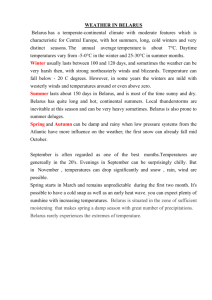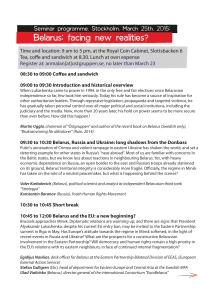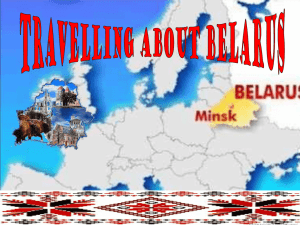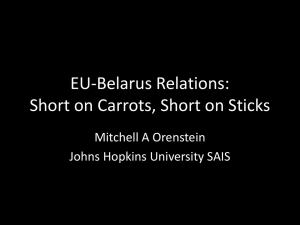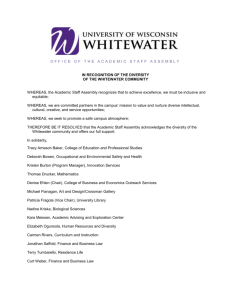PR_INI_art97
advertisement
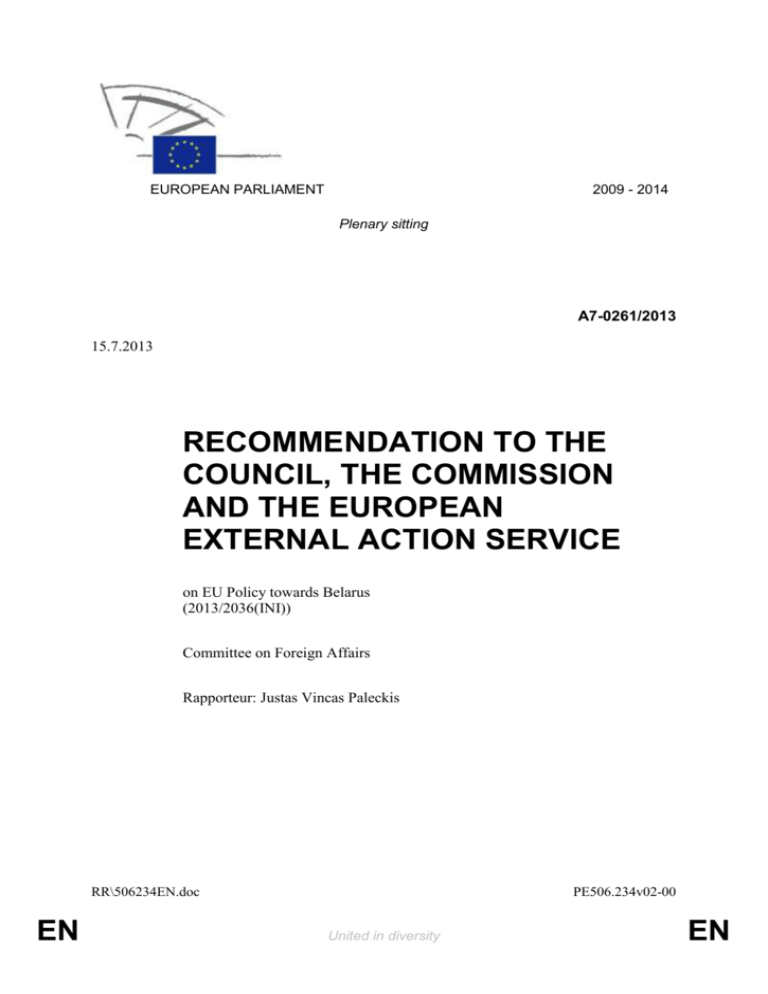
EUROPEAN PARLIAMENT 2009 - 2014 Plenary sitting A7-0261/2013 15.7.2013 RECOMMENDATION TO THE COUNCIL, THE COMMISSION AND THE EUROPEAN EXTERNAL ACTION SERVICE on EU Policy towards Belarus (2013/2036(INI)) Committee on Foreign Affairs Rapporteur: Justas Vincas Paleckis RR\506234EN.doc EN PE506.234v02-00 United in diversity EN PR_INI_art97 CONTENTS Page RESULT OF FINAL VOTE IN COMMITTEE ...................................................................... 15 PE506.234v02-00 EN 2/15 RR\506234EN.doc PROPOSAL FOR A EUROPEAN PARLIAMENT RECOMMENDATION TO THE COUNCIL, THE COMMISSION AND THE EUROPEAN EXTERNAL ACTION SERVICE on EU Policy towards Belarus (2013/2036(INI)) The European Parliament, – having regard to its resolution of 26 October 2012 on the situation in Belarus after the parliamentary elections of 23 September 20121, – having regard to its resolution of 29 March 2012 on the situation in Belarus2, – having regard to its resolution of 12 May 2011 on Belarus3, – having regard to its resolution of 20 January 2011 on the situation in Belarus4, – having regard to its resolution of 12 September 2012 on the Annual Report from the Council to the European Parliament on the Common Foreign and Security Policy5, – having regard to its resolution of 14 December 2011 on the review of the European Neighbourhood Policy6, – having regard to the Resolution of the Conference of the National Platform of the Eastern Partnership Civil Society Forum of 1 June 2013, – having regard to its resolution of 7 April 2011 on the review of the European Neighbourhood Policy – Eastern Dimension7, – having regard to the Prague Declaration of the Eastern Partnership 2009 summit; – having regard to the conclusions of the Foreign Affairs Council of 15 October 2012 and to the Council Regulation of 06 November 2012 on restrictive measures in respect of Belarus8, – having regard to Rule 97 of its Rules of Procedure, – having regard to the recommendation of the Committee on Foreign Affairs (A7-0000/2013), 1 Texts adopted, P7_TA(2012)0410. Texts adopted, P7_TA(2012)0112. 3 Texts adopted, P7_TA(2011)0244. 4 OJ C 136 E, 11.5.2012 p.57. 5 Texts adopted, P7_TA(2012)0334. 6 Texts adopted, P7_TA(2011)0576. 7 Texts adopted, P7_TA(2011)0153. 8 OJ L 307/1, 7.11.2012. 2 RR\506234EN.doc 3/15 PE506.234v02-00 EN A. whereas since 1994 no free and fair elections in Belarus have been conducted under electoral legislation in line with international standards; B. whereas the principle of separation of powers was virtually abolished by the constitutional reform of 1996, and the political opposition has not been represented since in political institutions and has not been able to participate in the formulation and implementation of the political course of the country; C. whereas in 1997 the European Council suspended the ratification of the Partnership and Co-operation Agreement and froze the Interim Trade Agreement, therefore EU-Belarus relations remain regulated by the 1989 Trade and Co-operation Agreement; D. whereas over the same period human rights and fundamental freedoms have been systematically and massively violated with regard, in particular, to freedom of expression, freedom of association, freedom of assembly; E. whereas the European Parliament does not recognise the legitimacy of the Belarusian parliament; in the past decade, only one official delegation of the European Parliament visited Belarus in 2010; F. whereas democratic transformation could probably be more likely if reformist parts of the elites currently ruling would engage in reforms; however, major catalysts should come from civil society organisations and private business; G. whereas Belarus is the only European country applying capital punishment; execution dates are unknown to the families of the convicted and the public, the body is not given for burial to the relatives, and the place of burial is not communicated; H. whereas 70 % of the Belarusian population desire change in the country; however, part of it perceives that substantial changes would initially lead to a deterioration in standards of living1; I. whereas in 2008-2010, EU-Belarus relations had gained some momentum when Belarus showed willingness to develop constructive relations with the EU, and a certain movement towards improved conditions for activities of civil society, opposition and free press was observed; however, the brutal crackdown following the 2010 presidential elections and tightening of repressive policy, such as the arrest of presidential candidates followed by mass arrests, politically motivated criminal cases against representatives of the opposition, and a wave of repression against human rights defenders and independent media, led to a significant deterioration of these relations; J. whereas, as a consequence, EU restrictive measures have been reviewed and extended (currently imposed on 242 persons and 30 entities), while the Belarusian authorities continue to ban some politicians, officials, including representatives of international organisations, journalists and civil society representatives from entering the country; K. whereas the Eastern Partnership Summit in Vilnius could become yet another important 1 Data from Independent Institute of Socio-economic Studies, April 2013. PE506.234v02-00 EN 4/15 RR\506234EN.doc opportunity for the conditional and gradual improvement of EU-Belarus relations, as long as all political prisoners are released and politically rehabilitated; L. whereas the establishment of a consistent political dialogue with Belarusian authorities under the above-mentioned condition should result in involving civil society and opposition in the multi-stakeholder dialogue and implementation of the reforms; M. whereas the decrease in the absolute number of politically motivated arrests (down from 868 in 2011 to 235 in 2012, as reported by the Viasna Human Rights Centre) could be attributed to the atmosphere of repressions and intimidation; N. whereas recent restrictive legislative amendments have led to the further repression of civil society, including human rights defenders, independent media and defence lawyers; whereas the general situation with respect to human rights and fundamental freedoms is deplorable and remains a great concern, as highlighted in the 2013 report by the UN Special Rapporteur on Belarus; whereas the immunity shown by the Belarusian authorities to appeals made by the international community contributes to the further worsening of relations with the EU and contributes to the progressive self-isolation of Belarus; O. whereas further efforts towards a unified strategy and action plan could be helpful in achieving the political opposition’s goals; whereas concrete measures such as joint lists for the local elections in 2014, the drafting of a common political programme, or presentation of a single candidate for the presidential election in 2015 are positive developments in that regard; P. whereas the European Dialogue on Modernisation with Belarusian society launched in 2012 has had a positive impact on starting a constructive debate in Belarusian society on necessary reforms in the country and on awareness about the EU; however, further development of the concept, purpose, strategy, adequate funding and management structure of this Dialogue, as well as its better coordination with the Eastern Partnership initiatives, are necessary; Q. whereas Belarus ranks 50th according to the newest UN Human Development Index 2012, compared to Russia (55) and the Eastern Partnership countries (Georgia (72), Ukraine (78), Azerbaijan (82), Armenia (87), Moldova (113)); R. whereas one of the main reasons for a certain social stability in the country has been the social benefits system, whereby people profit and in return, choose to be politically inactive; 65 % of Belarusians receive state support in various forms, such as pensions, scholarships, unemployment benefits, etc; S. whereas a low unemployment rate can be artificially achieved through subsidies for state-owned companies which generate about 70 % of GDP and employ 50 % of the workforce; T. whereas until now the Belarusian authorities have expressed their geopolitical interest in further economic integration with Russia, creating the Eurasian customs and economic union; at the same time the vast majority of all direct foreign investment in Belarus in recent years is of Russian origin; according to experts, around 700 000 Belarusians have RR\506234EN.doc 5/15 PE506.234v02-00 EN emigrated to work to Russia, mostly to Moscow and St. Petersburg in recent decades; U. whereas signals both from the EU and Belarus on the recommencement of Belarus WTO accession negotiations are observed, especially in the context of Russia’s accession to the WTO; V. whereas the recent polls conducted in the framework of the EU Neighbourhood Barometer project suggest that over 50 % of the Belarusian population believe that the EU should increase its role in the areas of economic development, trade and regional cooperation with Belarus; W. whereas the programme of modernisation recently declared by Belarus authorities is, according to experts, mostly directed at upgrading the basic industrial infrastructure while more substantial economic reforms and a transparent business environment are needed in the country, along with reduced government control in all business sectors; X. whereas the situation in Belarus can be characterised by a lack of trust in the judiciary, due to its insufficient independence and politically motivated decisions; Y. whereas, according to the Corruption Perceptions Index 2012 by Transparency International, Belarus ranks 123 out of 176 countries and territories in comparison with Ukraine (144), Azerbaijan (139), Russia (133), Armenia (105), Moldova (94), and Georgia (51); Z. whereas EUR 33.4 million euro were allocated in the 2007-2013 financial perspective for the European Neighbourhood and Partnership Instrument (ENPI) cross-border cooperation projects between Belarus and its neighbouring countries, while around 60 municipalities currently participate in 50 joint cross-border cooperation projects between Latvia, Lithuania and Belarus; AA. whereas in 2012 two persons were executed despite the judicial process not having met the criteria of a fair trial; whereas in 2012 no death penalty sentence was announced after a long period, but new sentences were, however, declared in 2013; AB. whereas, according to the 2013 World Press Freedom Index by Reporters without Borders, Belarus moved up to the 157th position from the 168th out of 179 countries, however it still remains in the lowest position among the Eastern Partnership countries (Azerbaijan (156), Ukraine (126), Georgia (100), Armenia (74), Moldova (55)); AC. whereas access to independent TV and radio channels, as well as print media, is currently poor with state media dominating access to information; AD. whereas the situation of media freedom in Belarus is unacceptable, in particular due to the harassment of journalists banned from leaving the country, restrictive laws on broadcasting and internet freedom, and selective justice towards independent journalists, as demonstrated by three criminal cases that were initiated during summer 2012; AE. whereas in 2012 at least 15 activists and journalists were banned from leaving Belarus on the basis of false assertions; PE506.234v02-00 EN 6/15 RR\506234EN.doc AF. whereas there are still political prisoners in Belarus1, including Ales Bialatski, human rights defender and Sakharov Prize nominee, who endured severe psychological and physical torture including death threats, unjustified transfers, unsatisfactory health care provision and deprivation of the right to meet family members; the release and political rehabilitation of all political prisoners, as well as the progress of Belarus in fulfilling its international commitments and respecting fundamental human rights, the rule of law and democratic freedoms, remain the principal conditions for the normalisation of EU-Belarus relations; AG. whereas Belarus is the only country among the Eastern Partnership countries where an official human rights institution has not yet been established; AH. whereas censorship is a serious political issue in Belarus; AI. whereas in 2012 the Belarusian authorities introduced legislative changes that grant the KGB wide-ranging powers to use coercive measures freely; whereas under the new law, the security services may enter apartments and arrest and detain both Belarusian citizens and diplomats and representatives of international institutions protected by immunity without restriction; whereas this law also contains a provision freeing KGB agents of all legal responsibility for injuries suffered at their hands; whereas the Belarusian special forces have been given wide-ranging powers to break up demonstrations; AJ. whereas in 2011, the receipt of foreign grants became a criminal act, and the definition of treason was broadened, thereby making it possible for the authorities to use criminal law to crack down on organisations and individuals receiving funding from abroad or taking part in international events; AK. whereas in late 2011 changes were introduced to the Law on Mass Actions, according to which holding mass protests could result in criminal liability for public disorder; whereas the organisers of mass protests are obliged to provide the authorities with information on the sources of their funding; AL. whereas Belarusian authorities, rejecting calls for compliance with internationally accepted democratic standards by the EU, lead the policy of self-isolation, imposing it on the Belarusian people; AM. whereas in 2012, the Ministry of Justice of Belarus denied registration to 19 NGOs and two political parties while members of unregistered organisations are continuously intimidated, harassed and persecuted in Belarus; AN. whereas Belarus is covered by the European Neighbourhood Policy but, in view of the political situation, no action plan is yet in place; AO. whereas assistance for Belarus is currently granted under the Country Strategy Paper 2007-2013; 1 The list of political prisoners also includes Mikalai Statkevich, Dzmitry Dashkevich, Pavel Seviarynets, Eduard Lobau, Mikalay Antukhovich, Mikalay Dziadok, Ihar Alienevich, Aliaksandr Franskevich. RR\506234EN.doc 7/15 PE506.234v02-00 EN AP. whereas currently only 20 Belarusian experts participate in various ENPI projects in comparison to 120 in 2008; AQ. whereas the National Platform of the Civil Society Forum of the Eastern Partnership is an important and reliable partner and a unique communication channel to the Belarusian people for the EU; AR. whereas more than half of Belarusian citizens have internet access; electronic media present new possibilities of wider access for independent media, although there are some opposition websites which have been blocked in governmental and educational institutions; AS. whereas the Belarusian authorities actively take part in expert meetings in the framework of the multilateral track of the Eastern Partnership, in particular in cross-border cooperation projects; AT. whereas 58 cities and municipalities in Poland, 47 in Lithuania and 30 in Latvia maintain fruitful cooperation with their partner cities and municipalities in Belarus, while the ‘Nemunas-Neman-Niemen’ Euroregion which unites Lithuania, Poland and Kaliningrad with Belarus in common project implementation could be seen as a good practice example; AU. whereas Belarusians have been obtaining the greatest number of Schengen visas per capita in the world in recent years; however, they have to spend much more money, and in many cases also time and effort in order to obtain a visa, compared with citizens of other Eastern Partnership countries or Russia; AV. whereas the Belarusian Government attempts to attract foreign investment – it has a skilled workforce, a privatisation programme, six Free Economic Zones and a high technologies park – however, systematic state intervention is evident in the private sector; AW. whereas Belarus recently acceded to the Council of Europe’s anti-corruption mechanism Greco and became a member of Greta, the mechanism to combat human trafficking; 1. Addresses the following recommendations to the Vice-President of the Commission / High Representative of the Union for Foreign Affairs and Security Policy (HR/VP), the EEAS, the Council, the Commission and the Member States: that they should a. urge the Belarusian authorities to respect human rights and work towards a democratic transition in order to end the country’s self-imposed isolation from the rest of Europe; b. reiterate that an absolute prerequisite for any progress in bilateral relations, which could lead to the gradual lifting of EU restrictive measures and unlock EU-Belarus relations, is the unconditional and immediate release and rehabilitation of the political and civic rights of all remaining political prisoners; PE506.234v02-00 EN 8/15 RR\506234EN.doc On political dialogue c. take advantage of Lithuania’s Presidency and the Eastern Partnership Summit in Vilnius as a further important opportunity to improve relations with Belarus, as soon as all political prisoners have been released, in order to restart the political dialogue on, inter alia, democratic reforms, free and fair elections, respect for the rule of law, human rights and fundamental freedoms, and engagement with opposition and civil society, provided that the Belarusian authorities demonstrate respect for these fundamental values; d. make best use of the temporary and conditional suspension of the incumbent foreign minister from the EU visa ban list with a view to broadening the main and essential diplomatic communication channel with Belarus, in particular with a view to facilitating his participation in the Eastern Partnership summit; first and foremost for a meaningful dialogue on the release of political prisoners; nevertheless, to stay firm on the visa ban and asset freeze targeting those directly involved in violating democratic election standards and human rights; e. carry out an in-depth evaluation of the current EU restrictive measures against Belarusian officials and entities with the view, if needed, to improve their effectiveness and adapt their scope, nature and validity reacting to developments in the country and in its relations with the EU; f. prepare a strategic ‘roadmap’, inspired by the Joint Interim Plan and based on the ‘more for more’ principle, including priority areas for reforms in Belarus for the improvement of relations and effective cooperation within the framework of the ENP, provided that concrete steps towards democratic reforms are taken; g. as soon as the elections are recognised by international organisations as free and fair, consult the European Parliament on the inclusion of new proposals concerning inter-parliamentary relations, both bilaterally and within the Euronest Parliamentary Assembly, while maintaining EU support to Belarusian democratic forces and civil society; h. ensure, in line with Article 24 TEU, the support of the Member States for the EU’s position on Belarus and the compliance of their bilateral relations with the EU’s actions; emphasise that a firm commitment by all EU Member States as well as other democratic countries to act in a united manner may foster the successful promotion of universal democratic values and reforms in Belarus; i. encourage dialogue with the officials who were not personally involved in repression, in order to enhance EU-Belarus cooperation; contribute to their interaction with Belarusian civil society, with a view, ultimately, to facilitate reforms; j. encourage wider civil society, including trade unions and business representatives, as well as the political opposition, to increase their involvement in the Dialogue on Modernisation; on the basis of the recommendations drawn up by the National Platform of the Civil Society Forum, organise open public consultations on its concept, purpose, strategy and management structure; further support the Dialogue RR\506234EN.doc 9/15 PE506.234v02-00 EN through necessary financial assistance and expertise, and reinforce the communication campaign on its content and expected outcome; k. ensure that any participation by the authorities in the Dialogue on Modernisation, alongside and on an equal basis with democratic opposition and civil society, is conducted in full respect of democratic principles, with the view of developing a competitive economy and fostering democratic reforms, as well as a pluralistic society and the rule of law; l. assert that civil society remains a crucial actor in political dialogue with the EU in encouraging democratic change in Belarus and, therefore, support the idea of creating a civil society conference in Vilnius in anticipation of the third Eastern Partnership summit; m. make full use of the European Endowment for Democracy (EED) with a view to supporting key actors working on democracy and human rights issues in Belarus, focusing on those who have had difficulty accessing traditional EU support; n. urge Russia and Eastern Partnership countries to call upon Belarus to release immediately and unconditionally, and politically rehabilitate all political prisoners and to restrain from any further politically motivated harassment; o. ensure that EU and Member State representatives visiting Belarus maintain regular contact with representatives of civil society and of the opposition, in order to guarantee balanced participation by all parties in the processes concerning EU-Belarus relations; p. envisage all available policy options with the view of encouraging Belarus to: implement fully Electoral Code reforms on the basis of Organisation for Security and Cooperation in Europe/Office for Democratic Institutions and Human Rights (OSCE/ODIHR) recommendations so as to establish a pluralistic political system based on free and fair elections, where policy ideas would emerge from genuine political competition among political parties as a constitutive element of democracy; allow the re-opening of the closed OSCE office in Minsk; lift any obstacles and restrictions to the exercise of freedoms of association, expression, movement, peaceful assembly and thought for the democratic opposition, civil society organisations and NGOs, including the removal of any obstacles to registration, and the fully-fledged functioning and reception of technical assistance for international development; reform the provisions of its Criminal Code on participation in unregistered organisations; introduce the necessary institutional changes to ensure independence of the judiciary, in line with the recommendations by the UN Special Rapporteur on the independence of judges and lawyers, as well as an independence of lawyers by amending and effectively applying the Law on the Legal Profession; PE506.234v02-00 EN 10/15 RR\506234EN.doc not implement the execution of those sentenced to death in 2013, and introduce a moratorium on followed by the abolition of the death penalty; implement the decisions on the individual cases of the UN Human Rights Committee and the UN Working Group on Arbitrary Detention and the recommendations made by the UN Committee against Torture in 2011 with the view of stopping inhuman and degrading treatment; fully cooperate with the UN Special Rapporteur on the situation on human rights in Belarus to address the serious concerns expressed in his report of April 2013 and accept his demand of a visit to the country; fully modernise the penitentiary system and step up cooperation with the Council of Europe, first of all by signing the European Convention on the Prevention of Torture and Inhuman and Degrading Treatment or Punishment, granting the Committee for the Prevention of Torture regular access to places of detention, in particular those of political prisoners and human rights defenders; allow access for representatives of other relevant international and national organisations, diplomats, civil society groups, as well as members of families of political prisoners to Belarusian prisons; establish an independent and fully functional national human rights institution that could take the form of an ombudsman; guarantee equal opportunities and equal rights for, and the inclusion and non-discrimination of, all national minorities, ensure the normalisation of the Union of Poles’ situation in Belarus; end the marginalisation of the Roma minority, make progress in respecting religious rights and freedoms, as well as in the non-discrimination of LGBT citizens; q. with regard to the effective freedom of and access to media, take the following actions: urge Belarus to lift accreditation restrictions for journalists and restrictions on the use of satellite television, intensify EU financial and technical assistance to all types of independent media (within and outside the country) in order to ensure their sustainable functioning and potential wider access to them; provide assistance aimed at completing the application of the European aid programmes, developing joint projects and consortia with international press agencies and foreign media; On economic and energy cooperation r. seek a constructive EU-Belarus technical dialogue on macroeconomic developments and financial issues to achieve a credible commitment by Belarus on macroeconomic and structural reforms including the privatisation of state-owned enterprises, price, trade and banking system liberalisation, the development of an appropriate social safety net, and the fight against corruption; s. further emphasise that the above reforms, provided that the key political prerequisites are fulfilled, are vital to the economic development of Belarus, would facilitate European investment and international loans, could send a positive signal for RR\506234EN.doc 11/15 PE506.234v02-00 EN removing existing obstacles to WTO negotiations and would, therefore, enable further integration into the world economy; t. offer technical assistance to create a favourable business environment with the view of establishing a level playing field, security of investment and equal opportunities for all companies, and especially SMEs; u. engage further with Belarus on employment issues, including human capital and skills development matching labour market demand; v. encourage Belarus to implement International Labour Organisation (ILO) recommendations, in particular concerning the freedom of association, registration and activities of independent trade unions; urge Belarus to amend its legislation with the view of guaranteeing that workers can freely and without any restrictions quit their jobs both in the public and private sector; w. call on Belarus to enforce the highest international safety standards and a truly independent environmental impact assessment for the construction and operation of all power plants, optimising expertise and financing from all available international instruments in full compliance with existing international legislation such as the Espoo Convention and the Aarhus Convention and following the commitment of 23 June 2011 to undertake comprehensive risk and safety assessments (stress tests), taking into account the specifications agreed by the European Commission and the European Nuclear Safety Regulators Group; x. assist in developing the diversification of energy resources and supply routes in Belarus and share EU best practices in carrying out international and regional ‘green economy’ projects, with support for energy efficiency and renewable energy sources; y. promote further regional cooperation with Belarus including through Eastern Partnership sectoral initiatives, in particular in terms of trade, energy, environment and transportation; encourage the best practice of bilateral economic forums whilst also aiming for more capacity-building of non-state actors, as well as the promotion of good governance and public administration reform; z. continue to provide technical and health assistance to the population affected by the Chernobyl nuclear disaster; aa. encourage Belarus to explore and develop unconventional energy sources; On border management ab. strengthen EU-Belarus cooperation on border management and the fight against cross-border crime and in particular assist Belarus in developing its transit system, modernising customs and border control procedures and fully implementing the EU Integrated Border Management concept; ac. ensure unrestricted entry and travel across Belarus for EU diplomats and politicians; PE506.234v02-00 EN 12/15 RR\506234EN.doc ad. provide, in mutual interest, further training for the Belarus border management agency in line with the Schengen acquis; ae. consider providing appropriate technical assistance to be used for introducing up-to-date border control systems and modern infrastructure on the EU side; af. provide the relevant Belarusian services with adequate training on EU best practices in the introduction of biometric passports; ag. launch an EU-Belarus Mobility Partnership and encourage Belarus to take an active role in the Eastern Partnership Panel on Migration and Asylum; ah. encourage collaboration between Belarus and the United nations Development Programme (UNDP) and the United nations Children’s Education Fund (UNICEF) in order to support programmes meant to combat human trafficking; On civil society and people-to-people contacts ai. increase the share of projects with greater benefit to and visibility for the population at large, which would foster citizens’ understanding of EU values, standards and policies and stress the advantages of its model and expertise; to promote, in this respect, the opportunity offered by the Civil Society Forum, in particular in view of its upcoming meeting in Chisinau in October this year; aj. systematically and uncompromisingly oppose any disinformation and misleading information by the Belarusian authorities on EU policies and projects by releasing and spreading all necessary information (data, figures, legislation); ak. intensify technical and financial support, also through the new European Endowment for Democracy, to civil society organisations, independent NGOs, human rights defenders and trade unions based in Belarus, or those in the Member States that have a key impact in Belarus; more actively engage civil society in the implementation, monitoring and assessment of EU funded projects; also significantly upgrade the communication and dissemination of EU information in order to develop citizens’ understanding of the EU’s approach to fundamental rights and freedoms and the need for social and economic progress; al. support organisations working to promote democracy and human rights, not only those based in Belarus, but also those based abroad, given that the Belarusian authorities consistently deny such organisations the possibility of registration; am. request that the Belarusian authorities implement Decision A/HRC/WGAD/2012/39 of the United Nations Working Group on Arbitrary Detention on the case of human rights defender Ales Bialiatski, which found in particular that the detention of Mr Bialiatski, President of the Viasna Human Rights Centre and International Federation for Human Rights (FIDH) Vice-President, was arbitrary, ‘being in contravention of Article 20, paragraph 1, of the Universal Declaration on Human Rights (UDHR) and Article 22 of the International Covenant on Civil and Political Rights’ (ICCPR); RR\506234EN.doc 13/15 PE506.234v02-00 EN an. urge Belarus to extend a standing invitation to all UN Special Procedures and invite the UN Special Rapporteur on the situation of human rights defenders to visit the country; ao. oblige the Belarusian authorities to remove criminal liability for the receipt of foreign grants and to allow organisations to keep funds in foreign bank accounts; ap. consider unilaterally facilitating the issuing of visas and reducing their cost from EUR 60 to an affordable level for Belarusian citizens, and making full use of the existing flexibilities offered by the Visa Code, including the waiver or reduction of fees for short-stay visas, in particular for young people, to facilitate and intensify people-to-people interaction and help prevent further isolation of Belarusian citizens; also consider unilaterally reducing or waiving the visa fees for long-stay visas with the long time goal of a visa free regime; aq. call on the Belarusian authorities to start negotiations with the EU on visa facilitation and readmission agreements with the long-term view of a visa-free regime to promote person-to-person contact and take urgent measures on implementing local border traffic agreements with Poland and Lithuania; ar. encourage the cooperation between cities and municipalities in the EU and Belarus using the good practice examples of some EU countries, especially Poland, Lithuania and Latvia; as. seek to provide more education and research opportunities in the EU for Belarusians in the fields of higher, informal and adult education; initiate and support an internship programme for young Belarusian professionals in EU institutions and other international organisations; further support the European Humanities University, develop and support education and vocational programmes within Belarus; secure adequate and lasting funding for the Erasmus Mundus programme for Belarusian students; at. actively seek opportunities to engage with Belarus in a dialogue on implementing profound reforms of its higher education system in order to develop, in particular, academic freedom, institutional autonomy and student participation with the aim of eventually joining the European Higher Education Area (the Bologna Process). 2. Instructs its President to forward this recommendation to the Vice-President of the Commission / High Representative of the Union for Foreign Affairs and Security Policy (HR/VP), the EEAS, the Council, the Commission and the Member States. PE506.234v02-00 EN 14/15 RR\506234EN.doc RESULT OF FINAL VOTE IN COMMITTEE Date adopted 9.7.2013 Result of final vote +: –: 0: Members present for the final vote Franziska Katharina Brantner, Elmar Brok, Jerzy Buzek, Tarja Cronberg, Arnaud Danjean, Susy De Martini, Mark Demesmaeker, Marietta Giannakou, Ana Gomes, Takis Hadjigeorgiou, Liisa Jaakonsaari, Anneli Jäätteenmäki, Tunne Kelam, Evgeni Kirilov, Maria Eleni Koppa, Andrey Kovatchev, Paweł Robert Kowal, Wolfgang Kreissl-Dörfler, Eduard Kukan, Vytautas Landsbergis, Sabine Lösing, Marusya Lyubcheva, Willy Meyer, Francisco José Millán Mon, Annemie Neyts-Uyttebroeck, Raimon Obiols, Ria Oomen-Ruijten, Justas Vincas Paleckis, Hans-Gert Pöttering, Cristian Dan Preda, Libor Rouček, Tokia Saïfi, José Ignacio Salafranca Sánchez-Neyra, Nikolaos Salavrakos, Jacek Saryusz-Wolski, György Schöpflin, Werner Schulz, Sophocles Sophocleous, Laurence J.A.J. Stassen, Davor Ivo Stier, Charles Tannock, Eleni Theocharous, Geoffrey Van Orden, Nikola Vuljanić, Sir Graham Watson, Boris Zala, Karim Zéribi Substitute(s) present for the final vote Adam Bielan, Marije Cornelissen, Göran Färm, Diogo Feio, Knut Fleckenstein, Jörg Leichtfried, Doris Pack, Jacek Protasiewicz, Marietje Schaake, Helmut Scholz Substitute(s) under Rule 187(2) present for the final vote Pat the Cope Gallagher, Jan Kozłowski, Marek Henryk Migalski, Sandra Petrović Jakovina RR\506234EN.doc 55 1 5 15/15 PE506.234v02-00 EN
